×
The Standard e-Paper
Kenya’s Boldest Voice

From early in the cool grey morning thousands of Kenyans were walking to Uhuru Park in the capital city. Long before the scheduled start of the occasion the grounds were full, and still filling. It was August 27th 2010.
The nation was there in person and before screens countrywide, to witness the promulgation of the Constitution of Kenya 2010. Diplomats were seated in good time in dutiful rows, awaiting the invited Heads of State and Government to take the front row.